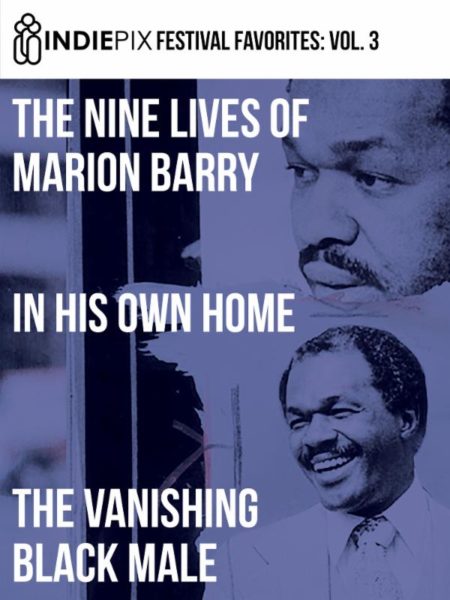
INDIEPIX FESTIVAL FAVORITES, VOLUME 3, being released in time to commemorate Black History Month this February, features three powerful, thought-provoking documentaries, each focusing on a different part of the African American experience.
Included in the value-priced DVD set are THE NINE LIVES OF MARION BARRY called “mesmerizing
[1]” and “a riveting history
[2],” THE VANISHING BLACK MALE, which film critic Kam Williams called the “Best Documentary of the Year” when released in 2005, and IN HIS OWN HOME, a hot-button, ripped-from-the headlines doc about police brutality.
THE NINE LIVES OF MARION BARRY
Many people remember Marion Barry as the philandering drug-addled mayor, the one who famously uttered the phrase “bitch set me up” as he was arrested during an FBI sting in 1990. He’s the poster boy for corruption, a pariah who will never be forgiven for bringing shame on the nation’s capital. Yet to others, Marion Barry is a folk hero.
Hailed as a civil rights champion and defender of the poor, he’s the man who transformed Washington D. C. from a sleepy southern town into a political stronghold of Black America.
Barry’s soaring achievements, catastrophic failures and phoenix-like rebirths have made him a symbol of mythic indestructibility. And from the Mississippi cotton fields to the corridors of power, Barry has weathered drug and alcohol addiction, cancer, 4 marriages, jail time, and political extinction to dominate Washington D. C.
city politics for more than 40 years. With unprecedented access, THE NINE LIVES OF MARION BARRY, from filmmakers Dana Flor and Toby Oppenheimer tells the continuing saga of this despised, beloved, and resilient politician. It’s a potent story of race, power, sex, and drugs; the tale of a complex and contradictory man who is the star of one of the most fascinating and bizarre chapters of American politics.
Sam Allis of The Boston Globe said, “No screenwriter would dare dream up the rise and fall of Marion Barry. You can’t make this up. Which is why The Nine Lives of Marion Barry is such addictive viewing.
. . mesmerizing,” Linda Winer of Newsday commented “The rise and fall (and rise and fall and rise-how many is that?) of Marion Barry is a story worth telling” and David Hinkley of the New York Daily News, said, “Love Barry or hate him, it’s a remarkable tale. . .
Flor and Oppenheimer have done a fine job of letting it tell itself. ” THE VANISHING BLACK MALE
In 2005, director Hisani DuBose looked around and realized that with over one million black men incarcerated, and high homicide and death rates, the African American male just may be becoming an endangered species. So, she set out explore whether or not black men are in danger of becoming extinct in THE VANISHING BLACK MALE. In a provocative and probing documentary, actor Melvin Jackson, Jr.
(“The Wire,” “Everybody Hates Chris”) speaks with African American men of all walks — doctors, politicians, college students, teachers, law enforcement personnel and others – to determine the state of the black man in America. Edited by award-winner Alfred Santana (Voices of the Gods), the compelling and incredibly timely exploration is interwoven with music, art and a series of monologues. IN HIS OWN HOME
Before Michael Brown and Ferguson, Missouri, the headline-making killing of Trayvon Martin and the death of Eric Garner at the hands of New York City police officers, there was the shocking 2010 shooting ofKofi Adu Brempong, a disabled Ghanaian graduate student attacked by University of Florida campus police responding to a 911 call.
And though few media outlets outside of Gainseville reported the story, the powerful, hot-button documentary featurette, IN HIS OWN HOME, recounts the events of that fateful March day and their aftermath: we watch live video of the police attack on Kofi’s apartment; we hear accounts of those who marveled at the number of snipers “ready to shoot at any time” as they surrounded the apartment of a lone student, as well as from fellow students who attest to Kofi’s peaceful demeanor; and, we hear from police officers who explain how they felt threatened and had to shoot.
And, in the aftermath, we bear witness to the administration’s shortcomings and the students and community activists who demand justice.
Underlining a pattern of racism and police brutality, as well as the frightening “militiarization” of campuses nationwide, IN HIS OWN HOME speaks to widespread and pervasive issues in our country that will, for the time being, remain among our most controversial and disconcerting.


